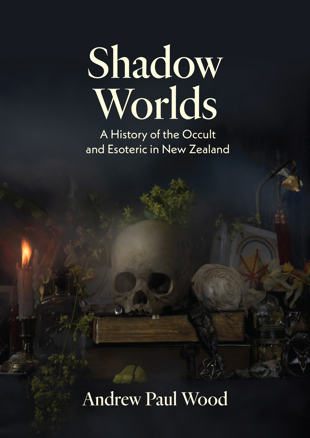Ethan Doyle White reviews Shadow Worlds: A history of the occult and esoteric in New Zealand by Andrew Paul Wood for Nova Religio:
‘Back in 1993, the prominent American scholar of religion Robert Ellwood brought out Islands of the Dawn, a study of culturally alternative religious movements in New Zealand. Now, thirty years on, the subject has been broached again, this time by Andrew Paul Wood, a New Zealand writer known for his work on aesthetics and art history. Shadow Worlds is a broad-ranging book that sits somewhere between scholarship and popular nonfiction, combining extensive use of references with a punchy style characterized by short paragraphs and a good dose of irony and humor. It is a fairly easy read and, for the most part, a thoroughly enjoyable one.
Wood focuses on what he terms “the occult and the magical” (14), esoteric traditions of western origin that have been introduced to New Zealand by white settlers and visitors, thus leaving aside both indigenous Māori religions and traditions imported from Asia and Africa. This still gives him considerable ground to cover, starting with Theosophy and moving on to Golden Dawn-derived ceremonial magic groups, Anthroposophy, and Spiritualism—which unsurprisingly receives the longest chapter.
From there, he deals with several women, like Frieda Harris (1877–1962), who had links to both New Zealand and to the prominent British occultist Aleister Crowley (1875–1947). He then looks at spiritual healing groups like the School of Radiant Living, the emergence of the New Age and modern Pagan milieus, occult orders like the Ordo Templi Orientis (OTO) and the Ancient and Mystical Order Rosæ Crucis (AMORC), and finally Satanism. In his epilogue, Wood suggests that New Zealand has been “a peculiarly fertile soil for eccentric and novel spiritualities” because of its colonial “legacy of atrocity and theft” (364), although one could argue that similar developments can be seen in almost every western country, from Ireland to Australia, regardless of their relationship to colonialism and colonial violence.’
Read the rest of the review here.


